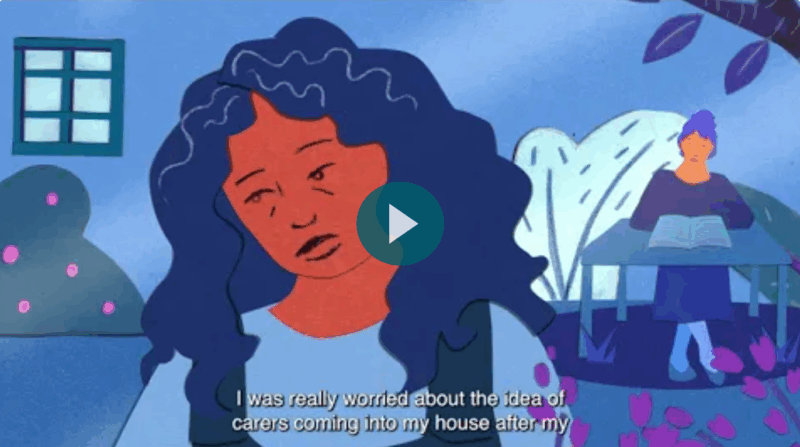“I came through the 80s, AIDS and all that and Section 28, and I don’t ever want to feel like I’ve got to go back into the closet and not disclose my life.”
The Life House Project Participant
As we consider what it means to enter later life, many of us experience unease and strive to retain control over our choices and our lives. Some alleviate this anxiety by making provision, such as having a pension, managing debts before retirement or creating a will. Yet studies conducted by the University of Surrey have discovered that for many older LGBTQ+ people, age-related concerns become heightened. Not only are members of this community navigating old age, which can stir up worries – for example, losing independence, declining health and becoming socially invisible, but for many LGBTQ+ people, these fears collide with the reality of ageing in a heteronormative society, where questions of safety, belonging, and dignity can feel even more pressing.
Some older LGBTQ+ people worry about professionals visiting their home, such as care or maintenance staff, leading them to hide photos, flags or other keepsakes that might reveal their gender identity or sexual orientation. Spaces like care homes and retirement communities, which should feel supportive, caring and safe, also spike anxiety due to past experiences of discrimination or the fear of encountering prejudice in these settings. This raises the question of what can be done to create change?
The Life House Project (THLP), led by the University of Surrey, uses theatre to amplify the voices of this ageing community and advocate for more LGBTQ+ inclusive housing and social care. In partnership with London Bubble Theatre, animator Izzy Barszcz and members of the older LGBTQ+ community, we decided to create a short animation, highlighting the real challenges this community faces and offering ideas for how housing and care providers can create spaces that are truly LGBTQ+ inclusive and safe. The process of co-developing the animation brought moments of fun, laughter, and hope, fused with feelings of sadness, pain, and trauma. London Bubble Theatre hosted four 90-minute workshops that utilised theatre activities, such as improvisation, storytelling, and character development, to form a five-minute animation script. During these workshops, the group explored the complex issues that LGBTQ+ people encounter in their younger years, while also sharing their hopes and anxieties about ageing as a queer person. Tales of abuse, prejudice and micro-aggressions in later life emerged, and this testimony resulted in the characters being rooted in truth, observations and lived experiences. As the characters began to form, the group recognised the importance of representing intersectionality, ensuring that race, culture, disability, health, and class were explored alongside age, gender, and sexual orientation. These sessions were also attended by the Lead Animator, Izzy Barszcz, enabling her to capture visual details that couldn’t be included in the script, ensuring participants’ ideas were incorporated at every stage. Participants noted that the process of creating the animation was “deeply moving. Giving voice to the reality of the lives a lot of us live … ”. At the same time, another commented, “it felt like my voice was heard”.
Born from the workshops were three co-created characters, each navigating different housing and care issues: Ritu, a recently widowed lesbian living independently with visiting carers; Peter, a single gay man residing in a care home; and Rose, a trans woman living in Sheltered Housing with her long-term cisgender wife. Together, Ritu, Peter, and Rose guide the audience through a journey that exposes the prejudice and abuse that can occur within care and housing, while also imagining ways to challenge and prevent it.

The animation is now being trialled as part of ongoing staff EDI training in care and housing sites in London and has sparked a range of emotions. One professional reflected, “I found the animation heartbreaking to watch, knowing that older, vulnerable, LGBTQ+ people can be treated in such horrible ways by carers and in spaces that should be safe and inclusive”, while another said, “storytelling is always a great way to bring people’s stories to [the] light and the animation does that perfectly”. The early results have evidenced that immediately after viewing the animation:
- 100% felt that the animation training session was excellent/good;
- 90% reported that their understanding of the acronym LGBTQ+ had improved;
- 86% experienced increased knowledge of LGBTQ+ older people’s needs;
- 90% had increased confidence in providing support for older LGBTQ+ people.
The Life House Project serves as a reminder that theatre and storytelling are more than just leisurely pursuits; they can also promote and evoke change. When stories of older LGBTQ+ lives are heard, empathy grows, and our minds not only begin to think, but our hearts begin to feel. Through this understanding deepens, and meaningful change becomes possible.
“I found the animation heartbreaking to watch, knowing that older, vulnerable, LGBTQ+ people can be treated in such horrible ways by carers and in spaces that should be safe and inclusive”
Staff member
Dr Georgia Bowers is the lead investigator at the University of Surrey for this project and a Lecturer & Course Leader Applied and Contemporary Theatre (GSA).
Find out more about the Life House Project Team and a short film following the project development.